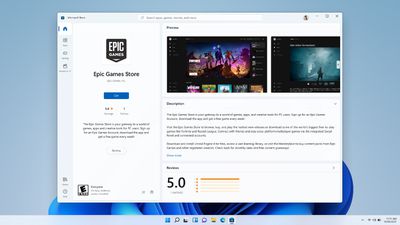Microsoft today announced that it is opening up the Microsoft Store for Windows to third-party storefront apps, including the Epic Games Store and the Amazon Appstore. Epic and Amazon's stores will be discoverable on the Microsoft Store for Windows and can be downloaded like any other app.

As a reason for the change, Microsoft said that it wants to ensure that its "business terms are fair" and also to "help promote innovation."
Our commitment to being an 'open Store for an open platform' isn't just about the various technical underpinnings of how apps are built. It's also about making sure our business terms are fair and help promote innovation. For instance, the Microsoft Store on Windows no longer requires app developers to share revenue with Microsoft, when apps manage their own in-app payment systems.
In that spirit, today we're announcing another significant update to our Microsoft Store on Windows policies, which will allow third-party storefront apps to be discoverable in the Microsoft Store on Windows.
Support for third-party app store options is what Epic Games has been pushing for in its ongoing legal battle with Apple, but Apple has no intention of implementing support for such a feature. Apple has argued that third-party app stores or sideloading apps would compromise the privacy and security of iOS devices.
Two major Apple competitors, Google and Microsoft, now support alternate app installation options on their platforms, something that could potentially sway regulators working on antitrust legislation in the United States and other countries.
Epic Games was not successful in its efforts to convince the court that Apple needs to be forced to allow alternate app stores, and Epic Games is now appealing the ruling in the Epic v. Apple lawsuit. There was one win to come out of the dispute, though, with the judge ruling that Apple must allow developers to offer a button or a link to their websites where non-in-app purchase payment options are available.
Microsoft has been involved in the ongoing antitrust investigations that Apple and Google are facing in the United States, but not on the side of the tech companies. Microsoft president Brad Smith said in June that it's time for regulators to investigate App Stores.
Back in 1999, Microsoft lost an antitrust case and was accused of maintaining a monopoly in the PC market. Microsoft was forced to submit to oversight and was required to share its APIs with third-party companies.























